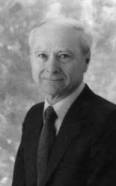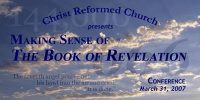 Upon hearing the news that Meredith Kline had died (Friday, April 13), came that all-too familiar bittersweet reaction. On the one hand, I was saddened but not really surprised, since I knew that Dr. Kline had been ill for some time. On the other, I recalled the words of Psalm 116:15: "Precious in the sight of the LORD is the death of his saints." I would ask you to pray for Dr. Kline's wife and children (one of whom, Meredith M., was my Hebrew teacher), especially that our gracious God will comfort this family with the promise of Jesus Christ's victory over death and the grave.
Upon hearing the news that Meredith Kline had died (Friday, April 13), came that all-too familiar bittersweet reaction. On the one hand, I was saddened but not really surprised, since I knew that Dr. Kline had been ill for some time. On the other, I recalled the words of Psalm 116:15: "Precious in the sight of the LORD is the death of his saints." I would ask you to pray for Dr. Kline's wife and children (one of whom, Meredith M., was my Hebrew teacher), especially that our gracious God will comfort this family with the promise of Jesus Christ's victory over death and the grave.
I didn't know Dr. Kline very well, if at all. In fact, I was one of twenty or so students who had him for a course in Peneteuch and then for another class in the Old Testament section of our hermeneutics class. This was back in the days when Westminster Seminary California had just opened its doors in San Marcos, before the current Escondido campus was ready for students.
When I was a student at Westminster--back in 1982-84--I was a five-point Calvinist, but was still a functional dispensationalist and adamantly rejected paedobaptism. I sat through Dr. Kline's lectures struggling to make sense of them, and trying to understand why everyone else felt that it was such a privilege to study under him. I was just plain lost. If you've read Kline, you know what I mean.
At the time, my primary theological interest was apologetics. So, I was especially interested in Dr. Kline's lecture on the documentary hypothesis (JEDP). I was dismayed when Kline called our attention to JEDP by drawing the letters on the board. He then drew a red circle around these letters, and dramatically added a slash across them. And that was it! I thought he'd go through the evidence point by point which showed this critical reading of the Old Testament to be fallacious. Instead, Dr. Kline went on to lecture about the fact that the Book of Deuteronomy was structured along the lines of an ancient near-eastern Suzerainty treaty, and made the case that if Deuteronomy was such a treaty document, it must have been written in the middle of the second millennium B.C. If true, this absolutely destroyed JEDP, by demonstrating that the "D" source was written at one time, nearly a thousand years before the time of Josiah, when critical scholars claim that Deuteronomy was written. That places one of the books of the Pentateuch back in the days of Moses. I have used that argument ever since.
Therefore, it troubles me greatly when some who disagree with Kline's "framework" hypothesis about the creation days (which is a debatable issue), unjustly imply he was some kind of closet liberal. Kline defended inerrancy loudly and often in class, and his lecture on JEDP was among the most profound and decimating arguments against critical methodology I have ever seen!
And then there was the day when Dr. Kline was late to class. From the room in which we met, we could look out the window and see off in the distance the freeway off-ramp which people took to exit the freeway and enter the industrial park where the seminary held classes. Someone noticed a CHP officer giving a ticket to a very unhappy motorist who was gesturing emphatically. You guessed it, it was Dr. Kline. By the way, his lecture that afternoon was on "cult and culture" and the "two kingdoms." Dr. Kline didn't think it very funny, but we giggled through the whole lecture.
On another occasion, John Gernster came to lecture on his version of classical apologetics. Dr. Gerstner said something about Cornelius Van Til, with which Dr. Kline took great umbrage. Although it was a friendly debate, Dr. Kline was so upset that someone had misrepresented Dr. Van Til (he believed), that his hand was shaking visibly as he raised it to challenge Gerstner's assertion. Right then and there I understood the influence that Van Til had upon the Westminster faculty.
Upon my graduation from Westminster, I went back and read and then re-read (and then read again) Kline's Structure of Biblical Authority, Kingdom Prologue, and a host of journal articles Dr. Kline had written on eschatology and various biblical passages. And if you've read my stuff and heard my sermons, you know how Kline has influenced me in so many areas. Although I didn't really know him personally, I am so thankful to have had the opportunity to sit at his feet, even though it took a while for me to realize the value of what I had heard.
How many times I have wished that I could go back and take those same courses over again . . . But at least I have his books and journal articles. So, even in death, Dr. Kline still speaks.
 Wednesday, April 18, 2007 at 02:43PM
Wednesday, April 18, 2007 at 02:43PM  Here's an interesting list of the top 25 "Live" albums of all-time. Live albums are great because you not only get a "best of" set, you hear the band in the raw, without too much studio trickery. Not everyone likes them, however, for precisely those same reasons.
Here's an interesting list of the top 25 "Live" albums of all-time. Live albums are great because you not only get a "best of" set, you hear the band in the raw, without too much studio trickery. Not everyone likes them, however, for precisely those same reasons. 
















